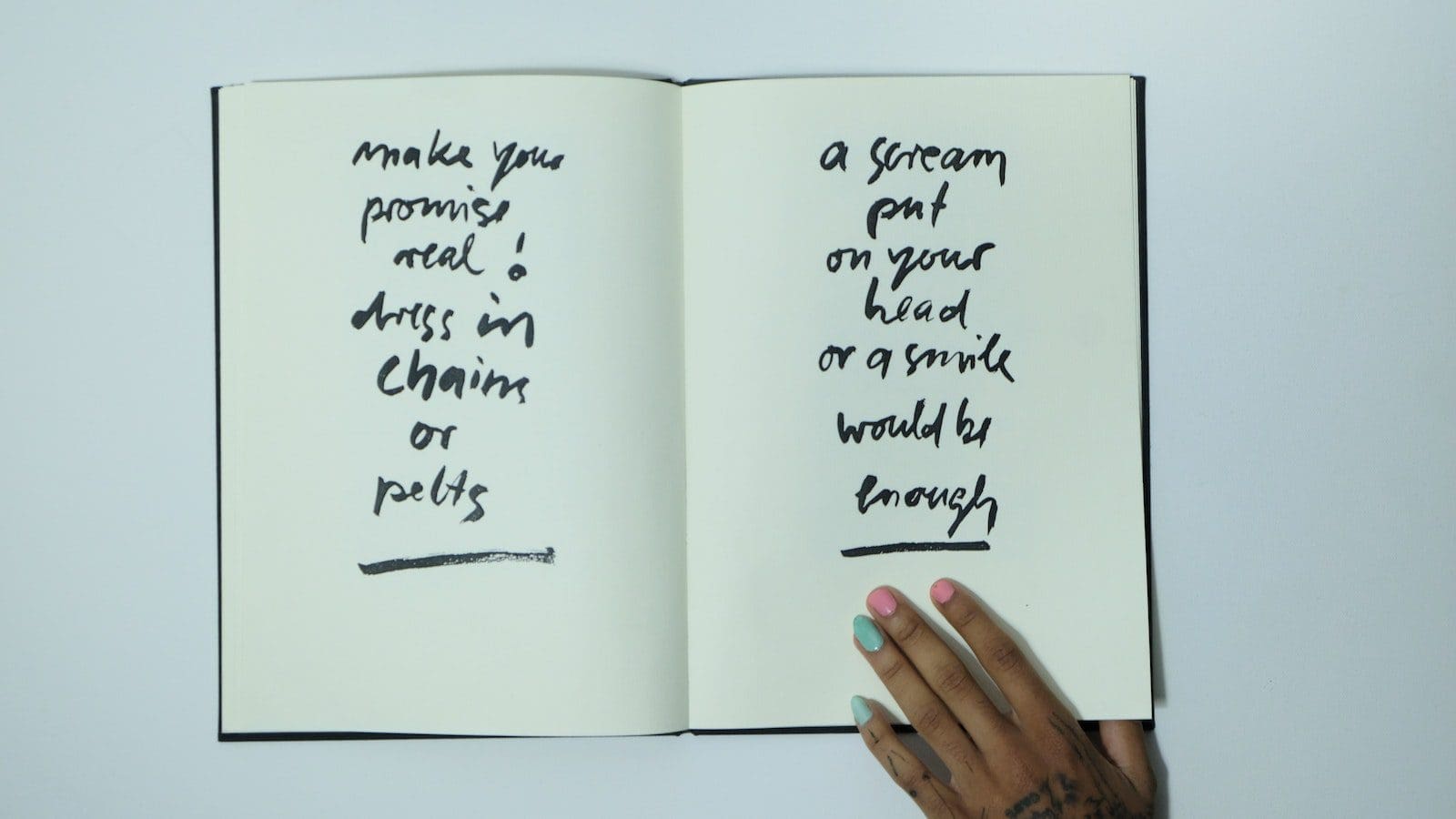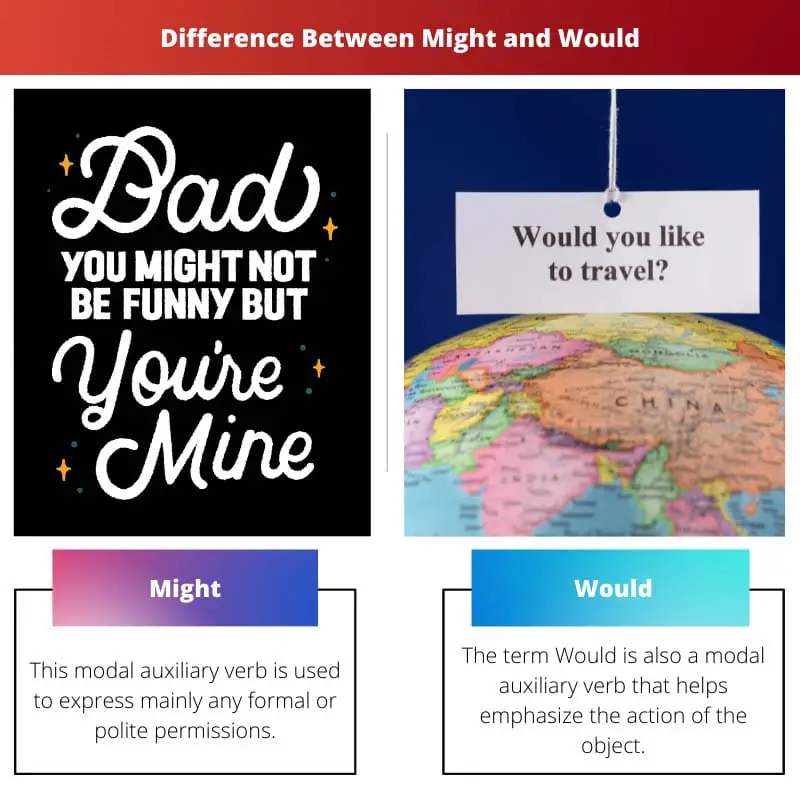Verbs are an essential part of English Grammar. Verbs are action words that talk about what the object does in the given statement.
Key Takeaways
- “Might” is used to indicate a possibility in the present or future, while “Would” is used to indicate a hypothetical situation or a future action.
- “Might” suggests a lower degree of probability than “Would.”
- “Might” can be used as a polite request or suggestion, while “Would” is used to express a desire or preference.
Might vs. Would
The word ‘might’ can be used to give suggestions. It is used in the formation of conditional verbs. For example, I might not go shopping tomorrow. It shows that I may or may not go shopping tomorrow. There are two possibilities. The word ‘would’ indicates a wish in a sentence. For example, I would like to eat noodles. It shows a desire to eat noodles.

Might is the past form of the verb ‘May.’ It is used to make any formal or seek polite permission. It measures the possibility of any work or task being done.
Would is an auxiliary word used to denote something that has occurred in the past or the future in the past. The term is used to express many things, such as – desires, ability, the willingness to do something, certainty, etc.
Comparison Table
| Parameters of Comparison | Might | Would |
|---|---|---|
| Expresses | Suggestions, Request, Possibility | Wish, Willingness, Intention |
| Past Tense | May | Will |
| Origin | Meahte or Mihte | Wolde |
| Implication | It implies something may or may not. | It implies that something will indeed happen. |
| Example | I might not come to school tomorrow. | We will go to watch movies tomorrow. |
What is Might?
This modal auxiliary verb is used to express mainly any formal or polite permissions. It articulates any unlikely possibility or something which may or may not happen.
It might initially originate from the Old English word ‘Meahte’ or ‘Mihte.’ It also communicates two possibilities at a time.
While expressing Possibility – When discussing any possibility, it gives certainty in a statement about any likely or unlikely situation. For example –
- I am hoping that she might have received the parcel yet.
- We might attend the party tomorrow.
When asking for any Permissions – May is the common word for permissions, but using might, might emphasize more and makes it more polite and formal. Consider the following example –
- Maa, I am hoping I might go to the movie tomorrow.
- I wonder If we might invite Sara for tomorrow’s night sleepover?
Expressing Suggestions – Might is used to give suggestions to someone. It is said indirectly and offers a possible action or unlike action. Consider the following given an example below –
- I thought you might like the movie, so I bought a CD for you.
- Might you come along with me on next week’s trip?
While commenting on two different opinions – It may be used to give two various contrary statements at a given time, as explained below –
- We might run a small business, but our customers are delighted with the service.
- I might not have much time, but I will be grateful for helping you with your studies this weekend.

What is Would?
Would it also be a modal auxiliary verb that helps emphasize the object’s action? The term is mainly used to discuss the past or future in the past tense.
The word Would originate from the Old English word ‘Wolde.’ It talks about something with certainty, wishes, desires, and willingness.
The structure of the formation of a statement by using Would is – Subject + Auxiliary Verb ‘Would’ + Main Verb. Consider the given example for better understanding – He would not go.
Here are given below some more examples of different situations –
- Sarah knew she would not be able to make it to the party. (Future Tense in the past)
- This mixer would not turn on this morning. (Willingness)
- Would you please clean your room today? (Requests)
- Would you like a cup of coffee? (Desires)

Main Differences Between Might and Would
- The implication of the word Might is used when the event or task may or may not happen, while the word Would is used when an event, study, or work will undoubtedly take place.
- Example for Might – The results of the test might come today.
- Example for Would: I would love to attend your sister’s birthday party tomorrow.

References
- https://journals.sagepub.com/doi/abs/10.1177/0146167293196003
- https://link.springer.com/article/10.1007%2FBF02295996
- https://psycnet.apa.org/record/1992-41453-001
- https://psycnet.apa.org/record/1992-41453-001

This article is full of useful information about the nuances of ‘might’ and ‘would’. Very well written!
Indeed, it provides a deep understanding of the differences between these two verbs.
Absolutely, it was a comprehensive read.
The post presents an extensive and precise guide to using ‘might’ and ‘would’ effectively.
Certainly a beneficial guide for English language learners.
The article provides a comprehensive understanding of the difference between ‘might’ and ‘would’. Very well written and informative.
I found it really helpful.
Indeed, the article offers a meticulous analysis of these verbs.
This article explains with great detail the difference between ‘might’ and ‘would’. It helped me a lot.
Yeah, I totally agree. It’s very informative.
Absolutely, a very insightful comparison. It’s nice to have such useful information in a single place.
This post provides a clear and detailed explanation, making it easy to understand the usage and differences of ‘might’ and ‘would’.
Indeed, it’s very thorough.
The examples are very helpful in illustrating the correct usage of these words.
A helpful guide for understanding the usage of ‘might’ and ‘would’ properly.
A thorough exploration of the usage and differences of ‘might’ and ‘would’.
Great insights into the verbs ‘might’ and ‘would’.
It’s a valuable post for anyone looking to refine their grammar skills.
This article is a great aid for anyone looking to enhance their grammar knowledge. Very informative!
It’s a very knowledgeable article.
Absolutely, it provides in-depth and clear insights.
I must say, it’s very educational and covers everything about ‘might’ and ‘would’.
Quite an informative post.
Absolutely, very helpful for learners.
I appreciate the depth of knowledge provided in this article about the usage of ‘might’ and ‘would’.
Yes, it explains the intricacies of grammar quite well.
Definitely helpful.